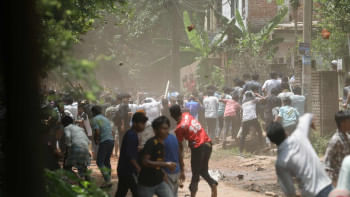Attack overshadows ANC
The African Nations Cup prepared for a subdued start Sunday with the opening game between Angola and Mali overshadowed by a deadly separatist attack on the Togolese team.
At least two people were killed and nine injured in Friday's ambush in the northern Cabinda enclave, darkening the spirit of what was intended to be a feast of African football ahead of this year's World Cup in South Africa.
Angola, finding its feet again seven years after a devastating civil war that killed at least half a million people, had hoped the arrival of world-class stars like Didier Drogba, Michael Essien and Togo's Emmanuel Adebayor would open a new chapter in history.
Instead the headlines are likely to remain focused on Friday's 20-minute hail of bullets 10 kilometres (six miles) from the Congo-Brazzaville border, no matter how compelling the football over the next three weeks.
The Forces for the Liberation of the State of Cabinda-Military Position (FLEC-PM) claimed the ambush and said attacks would continue because African football boss Issa Hayatou had refused to move games scheduled in Cabinda.
"This is going to continue, because the nation is at war, because Hayatou persists," the group's secretary general, Rodrigues Mingas, told AFP by telephone from France where he is in exile.
Togo's government ordered the team to withdraw from the competition, to allow for grieving.
But players said they would stay on, even as goalkeeper Kodjovi Obilale lay in a Johannesburg hospital recovering from surgery to bullet wounds to his lower back and abdomen.
Questions were inevitably asked about the wisdom of the event's organisers, the Confederation of African Football (CAF), in placing matches in a known separatist hotspot.
"We are all a little shocked and we're asking why CAF were holding games in Cabinda. How can you organise a tournament in a state of war?" Togo international Thomas Dossevi told AFP.
While the attack dominated news bulletins across the globe, Angolan state media took hours to even mention it with Friday's main TV news broadcast leading with an Angolan team training session.
The wall of silence was broken later when an Angolan government minister condemned the rebels' in a prepared statement.
Nations Cup organisers insisted the show would go on. "Our great concern is for the players, but the championship goes ahead," CAF spokesman Souleymane Habuba said late Friday.
On Saturday Angola's Prime Minister Paulo Kassoma called the attack an "isolated act" and guaranteed teams' security.
Some commentators raised questions about what the killing in Cabinda meant for the first World Cup on the continent thousands of miles away in South Africa in five months' time.
But 2010 World Cup chief Danny Jordaan gave the short shrift to the notion of any link, likening the situation to the bombing in London the day after the city was awarded the 2012 Olympics.
"It's nothing to do with it and I think everybody understands it has nothing to do with South Africa," he said.
"When there was a bomb in London no-one said we should not have 2012 in London so we cannot have double standards."
Hosts Angola will open the tournament at 1900 GMT Sunday by lining up against Mali at Luanda's Chinese-constructed November 11 stadium -- named to commemorate the day Angola achieved independence in 1975.
The competition may be going ahead, but no one will forget the bloody build-up.

 For all latest news, follow The Daily Star's Google News channel.
For all latest news, follow The Daily Star's Google News channel. 



Comments